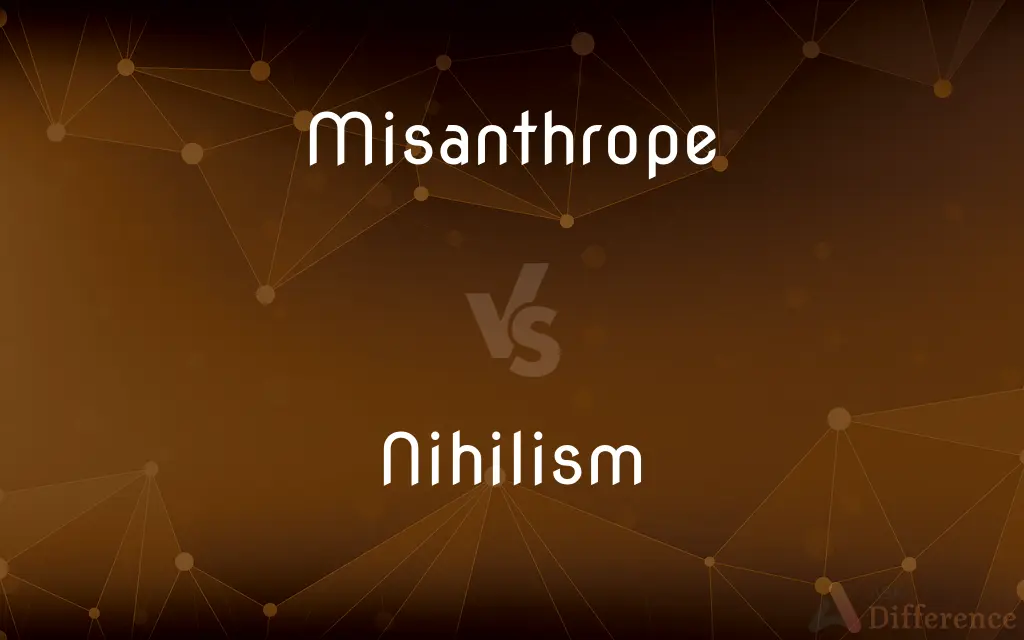Misanthrope vs. Nihilism — What's the Difference?
By Maham Liaqat & Urooj Arif — Updated on May 2, 2024
Misanthropy describes a general dislike or distrust of humanity, while nihilism is a philosophical belief rejecting all religious and moral principles, often expressing belief in life's meaninglessness.

Difference Between Misanthrope and Nihilism
Table of Contents
ADVERTISEMENT
Key Differences
Misanthropy centers around an individual's aversion to humans due to perceived flaws in human character or behavior, whereas nihilism delves into deeper philosophical territory, challenging the very existence of meaning, purpose, or inherent value in life.
A misanthrope may still hold personal or moral beliefs, while nihilists typically deny the validity of such constructs, viewing them as baseless.
Misanthropy often manifests in social withdrawal and a cynical view of societal interactions, on the other hand, nihilism might lead to existential questioning and a broader rejection of societal norms and conventions.
While a misanthrope might express negativity or disdain towards human interactions and relationships, nihilism could result in apathy or detachment from all aspects of life, including personal goals and ambitions.
Misanthropes focus their disillusionment specifically on humanity, in contrast, nihilists extend their skepticism to all aspects of the human experience, including philosophy, culture, and religion. Despite these differences, both perspectives can lead to a critical view of societal structures and human behavior, albeit from different philosophical foundations.
ADVERTISEMENT
Comparison Chart
Definition
Dislike or distrust of humans and human nature
Belief in the absence of objective meaning or value
Philosophical Focus
Human behavior and social interactions
Overall existence and universal constructs
Common Manifestations
Social withdrawal, cynicism
Apathy, existential questioning
Belief in Morals
May hold personal moral beliefs
Often rejects all moral or religious principles
Relationship with Society
Often critical of society due to human actions
Generally indifferent or rejecting societal norms
Compare with Definitions
Misanthrope
A person who dislikes humankind and avoids human society.
She became a misanthrope after years of observing deceit in her community.
Nihilism
A belief in the meaninglessness of life and all its aspects.
Nihilism often leads to a profound existential crisis.
Misanthrope
One who has a low opinion of human sincerity and integrity.
His misanthropic views often made him skeptical of new relationships.
Nihilism
A rejection of all philosophical or religious truths.
The philosopher’s nihilism was evident in his writings on morality.
Misanthrope
A character trait involving antipathy toward human connections.
As a misanthrope, he preferred the company of animals over humans.
Nihilism
An attitude of skepticism towards everything believed to be true.
His nihilistic approach to life made him indifferent to suffering.
Misanthrope
A disposition characterized by scorn for human ideals or efforts.
His misanthropic tendencies surfaced when discussing politics.
Nihilism
A viewpoint that traditional values and beliefs are unfounded.
His nihilistic perspective made him question all religious teachings.
Misanthrope
Someone who distrusts all people indiscriminately.
After the fraud, he lived like a misanthrope, shunning all social events.
Nihilism
A philosophy that denies any objective basis for society and morals.
Nihilism challenges the constructs that most societies hold sacred.
Misanthrope
One who hates or mistrusts humankind.
Nihilism
Nihilism (; from Latin nihil 'nothing') is a philosophy, or family of views within philosophy, expressing negation (i.e., denial of) towards general aspects of life that are widely accepted within humanity as objectively real, such as knowledge, existence, and the meaning of life. Different nihilist positions hold variously that human values are baseless, that life is meaningless, that knowledge is impossible, or that some set of entities do not exist, are meaningless, or pointless.The study of nihilism may regard it as merely a label that has been applied to various separate philosophies, or as a distinct historical concept arising out of nominalism, skepticism, and philosophical pessimism, as well as possibly out of Christianity itself.
Misanthrope
One who hates all mankind; one who hates the human race.
Nihilism
(Philosophy) The doctrine that nothing actually exists or that existence or values are meaningless.
Misanthrope
A hater of mankind; a misanthropist.
Nihilism
Relentless negativity or cynicism suggesting an absence of values or beliefs
Nihilism in postwar art.
Misanthrope
Someone who dislikes people in general
Nihilism
Political belief or action that advocates or commits violence or terrorism without discernible constructive goals.
Nihilism
Also Nihilism A diffuse, revolutionary movement of mid-19th-century Russia that scorned authority and tradition and believed in reason, materialism, and radical change in society and government through terrorism and assassination.
Nihilism
(Psychiatry) A delusion, experienced in some mental disorders, that the world or one's mind, body, or self does not exist.
Nihilism
The view that all endeavours are devoid of objective meaning.
Existential nihilism
Nihilism
The rejection of, or opposition to, religious beliefs, (inherent or objective) moral principles, legal rules, etc., often due to the view that life is meaningless (sense 1).
Moral nihilism
Nihilism
The rejection of non-proven or non-rationalized assertions in the social and political spheres of society.
Nihilism
A delusion that oneself or the world, or parts thereof, have ceased to exist.
Nihilism
Alternative case form of Nihilism
Nihilism
A doctrine grounded on the negation of one or more meaningful aspects of life; in particular, the view that nothing in the world actually exists.
Nihilism
(countable) Something that is regarded as meaningless.
Nihilism
Nothingness; nihility.
Nihilism
The doctrine that nothing can be known; scepticism as to all knowledge and all reality.
Nihilism
The theories and practices of the Nihilists.
Nihilism
A revolutionary doctrine that advocates destruction of the social system for its own sake
Nihilism
The delusion that things (or everything, including the self) do not exist; a sense that everything is unreal
Nihilism
Complete denial of all established authority and institutions
Common Curiosities
Is misanthropy a mental illness?
No, it is more a perspective or worldview than a psychiatric condition.
Do nihilists engage in political activities?
While nihilists may reject many societal structures, some might engage politically to express their views.
What drives a person to become a misanthrope?
Often, personal experiences with betrayal or disillusionment with society fuel misanthropic sentiments.
Can nihilism coexist with religious beliefs?
Typically, nihilism contradicts religious beliefs as it denies inherent truths and values.
How can someone challenge a nihilistic viewpoint?
Engaging with diverse philosophical ideas or finding personal meaning can challenge nihilistic views.
Can nihilism influence a person’s lifestyle?
Yes, nihilism can lead to detachment from societal norms and conventional life goals.
How do misanthropes interact in social settings?
They generally maintain a cynical outlook and may limit their social interactions.
Can a misanthrope have close friends?
Yes, a misanthrope can have close relationships, though they may be selective and cautious.
What kind of literature do misanthropes enjoy?
Misanthropes may prefer literature that critiques or explores the darker aspects of human nature.
Is nihilism connected to negativity?
While often associated with negative views, nihilism is more about skepticism towards meaning and truth.
Are nihilists always pessimistic?
Not necessarily; some may simply be indifferent or realistic rather than outright pessimistic.
What is a common misconception about misanthropes?
That they hate people; more accurately, they distrust or are disillusioned with people.
How does a misanthrope view societal progress?
They may view it skeptically, doubting the sincerity or effectiveness of efforts.
Do misanthropes believe in moral principles?
They might, but their beliefs are often colored by a distrust of general human sincerity.
Can nihilism lead to depression?
For some, the belief in meaninglessness can contribute to existential despair and depression.
Share Your Discovery

Previous Comparison
Badge vs. Medal
Next Comparison
Fit vs. FeetAuthor Spotlight
Written by
Maham LiaqatCo-written by
Urooj ArifUrooj is a skilled content writer at Ask Difference, known for her exceptional ability to simplify complex topics into engaging and informative content. With a passion for research and a flair for clear, concise writing, she consistently delivers articles that resonate with our diverse audience.
















































